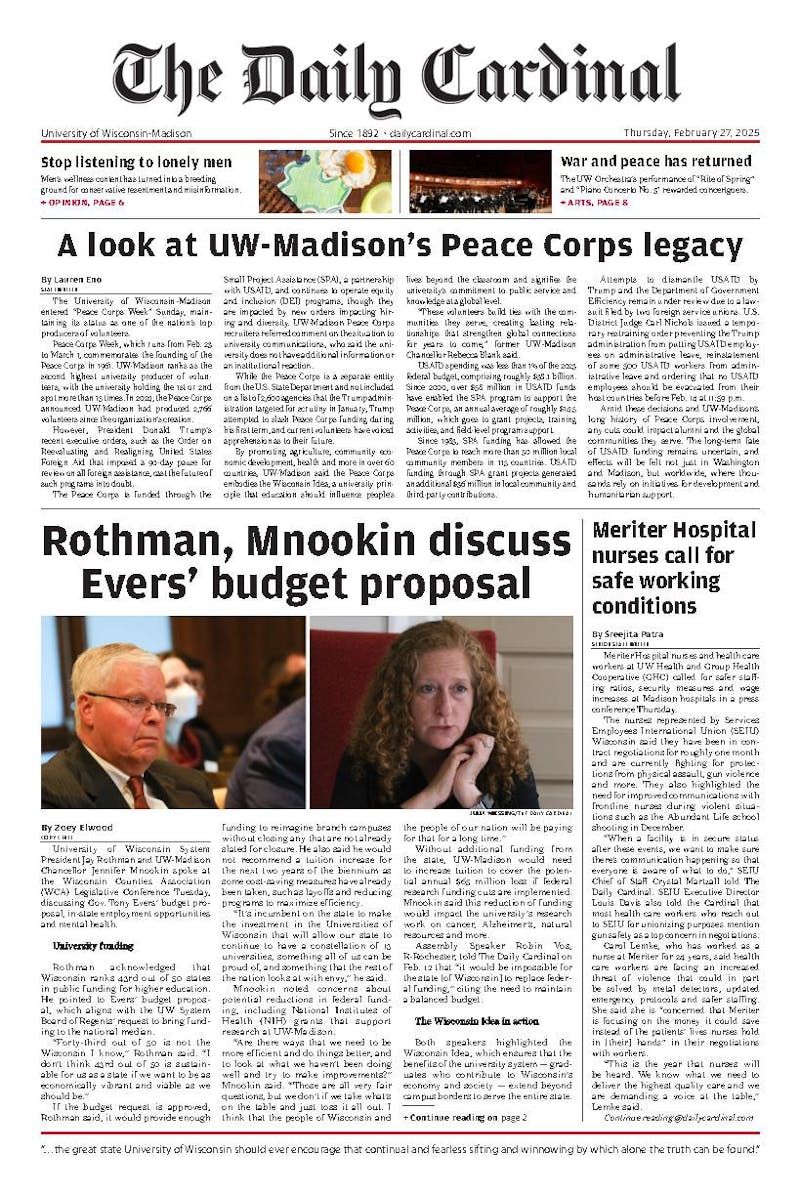Wisconsin Senate Majority Leader Devin LeMahieu (R-Oostburg) continued his push for a flat 3.25% state income tax in a Senate committee hearing Tuesday.
A flat tax — where all individual taxpayers in Wisconsin are assessed at the same tax rate regardless of their income — would overhaul the state’s current progressive income tax, which separates tax rates into four income ranges. Wisconsin’s tax system has distinguished between income brackets since 1911, according to Wisconsin Public Radio.
“[This is] a once-in-a-lifetime opportunity to lead Wisconsin forward and deliver generational tax reform,” LeMahieu said during Tuesday’s hearing.
Tax reform is at the center of Democrats’ and Republicans’ scramble for control of Wisconsin’s record budget surplus, currently estimated at over $7 billion. While Democrats seek relief for middle- and low-income earners, LeMahieu and a handful of Republicans favor removing the progressive tax system altogether.
"States like Tennessee have eliminated their income tax altogether, which ultimately would be where I'd like Wisconsin to go someday," LeMahieu said at Tuesday’s hearing.
However, Gov. Tony Evers already addressed LeMahieu’s proposal and said he would veto the tax plan.
Evers’ budget proposal favors tax relief for Wisconsin’s low- to middle-income earners and increased spending on education, workforce grants, Medicaid coverage and water quality testing.
“We maybe have the wrong governor for this bill,” LeMahieu said.
LeMahieu fields lawmaker concerns
Democratic members of the Senate’s Universities and Revenue Committee were also critical of the bill’s efficiency and fairness during Tuesday’s hearing.
“Is it efficient that a public school teacher who makes $45,000 pay the same tax rate as the CEO of a Fortune 500 company?” Sen. Brad Pfaff (D-Onalaska) asked.
“The idea that somehow the lowest income people are going to receive the trickle down benefit of the wealthiest getting a huge tax cut … it’s just beggar’s belief,” Sen. Kelda Roys (D-Madison) added. “I think what people want is to see their taxes used well.”
LeMahieu’s flax tax plan would cost the state $14.2 billion in lost tax revenue in the first four years, with most of the tax relief going toward the highest earners, according to a recent Legislative Fiscal Bureau analysis.
LeMahieu previously mentioned some revenue could come from increases in other taxes, such as sales tax. However, economists broadly agree such taxes are regressive and disproportionately impact low-income taxpayers.
In response to lost revenue concerns, LeMahieu claimed he had faith in the economy and suggested the lost revenue may be made up through increases in other taxes.
“We have a 12-year track record of providing tax cuts,” LeMahieu said. “The economy continues to grow and continue to invest in core priorities and that’s what we’re going to be moving forward,” LeMahieu told reporters after addressing the committee.
Ananth Seshadri, an economics professor at the University of Wisconsin-Madison and co-director of the Center for Research on the Wisconsin Economy (CROWE), testified at the hearing in favor of the bill. Seshadri presented research he co-authored with Junjie Guo and Kim J. Ruhl suggesting higher income taxes correlate to outward migration and lower skill acquisition rates.
Although government spending on welfare would decrease in CROWE’s analysis, the model predicted positive effects on business and increasing wages, according to Seshadri.
However, other analyses from the American Sociological Review and Center on Budget and Policy Priorities contradict Seshadri’s claims about a flat tax’s positive impacts on income and migration.
“I’m curious how many people you talked to, to reach these conclusions,” Sen. Pfaff said, pressing Seshadri on the real-world applicability of his report. Seshadri responded that his conclusions were based on an economic analysis and were not from a survey.
With the governor’s veto looming and Assembly Republicans slow to support a flat tax, LeMahieu’s plan is unlikely to become law this session.
Assembly Speaker Robin Vos (R-Rochester) said during a Tuesday press conference that his caucus does not have a specific tax reform plan as of yet.
“An awful lot of us want to take the time to listen first, which is why we have not necessarily said that the flat tax is the premiere way we’re going to adopt a tax reform,” Vos said. “We haven’t ruled it out either. I think it certainly is a long-term goal that all of us agree with, but I want to have a plan that can actually become law.”
Editor's note: This story was updated at 10:45 p.m. on Tuesday, May 2 to clarify findings from Seshadri's study. The study suggested "higher" income taxes correlated to outward migration and lower skill acquisition rates, not "progressive" taxes, as an earlier version of this article stated.
Alex Tan is a staff writer for the Daily Cardinal specializing in state politics coverage. Follow him on Twitter at @dxvilsavocado.






